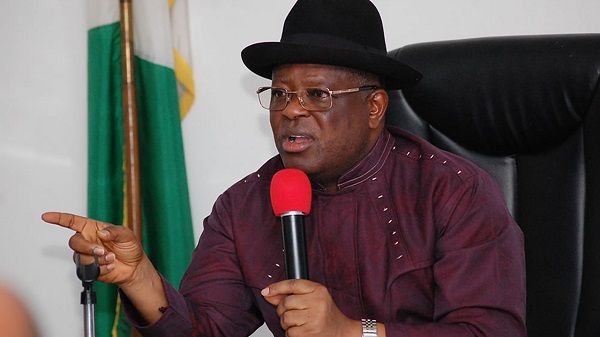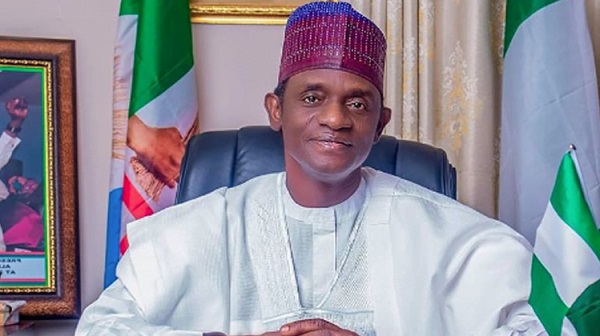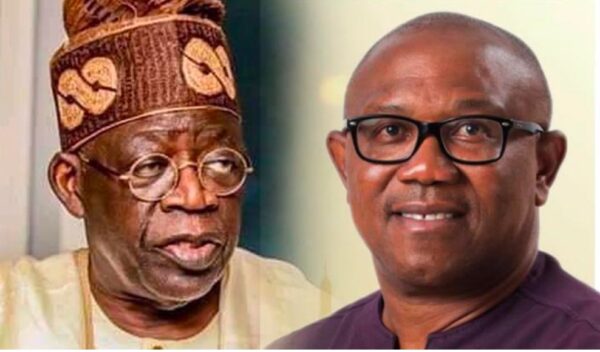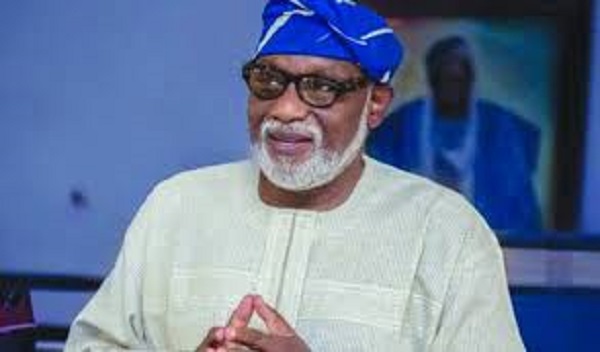Interrogating the clash of pen and ‘koboko’ in Ebonyi State

• Umahi’s Frustrations With Open Society
The recent decision by Governor David Nweze Umahi of Ebonyi State to restrict some journalists from government facilities in the state has brought back to national consciousness the challenges of media practice under the country’s democratic system.
Most Nigerians who recalled the cat and mouse relationship between the government and the press during the military era, expressed outrage at the insouciance of Umahi’s pronouncement, which they said echoes the mannerism of the jackboot period.
Governor Umahi had in a statewide Radio and Television live broadcast barred the Ebonyi State correspondents of two national newspapers from gaining entry to the Government House and other public facilities owned by the state government in the state, stressing that the embargo was for a lifetime period.
The governor, while expressing his displeasure with the leadership of the Nigria Union of Journalists (NUJ) for its failure to ensure the professionalism of its members, declared that for causing panic in the state, the security of journalists were no longer guaranteed.
Expressing dismay that his officials had tolerated one of the journalists he accused of filing negative reports about the state, Umahi stated: “We are not begging you to give us good report, because the only person that gives good or bad report is God. We are all accountable to Him. If you think that Ebonyi State is a dumping ground, try it again.
“If you think you have the pen, we have the ‘koboko’. Let’s leave the Court alone. Ebonyi people are very angry with the press and let me warn that I won’t be able to control them or know when they unleash mayhem on you, if you continue to write to create panic in the State. I want you to write it that way, that I said, press in Ebonyi is trying to create another COVID that is more dangerous and that is to create panic in our people.”
The governor’s allusion to possessing the Koboko (cockney for horsewhip), is the fact that some NUJ leaders are in the habit of approaching governors for support to stand for elections and other favours, junkets and freebies.
In his broadcast, the governor actually said: “I am very displeased with the president and leadership of the Nigeria Union of Journalists and I am going to cease their allowances for two months, because they have failed to discipline their members.
From the above, it could be deduced that Umahi’s twin lashes of the koboko depict denial of patronage and those freebies, as well as prompting overzealous supporters that come in different forms as youth groups or social mobilisers to ‘discipline erring journalists’.
There is no doubt that Umahi acted or reacted out of anger, but being a public officer and very importantly, the chairman of Southeast Governors’ Forum (SEGF), the implications of his outburst are far reaching, especially as they pertain to his understanding of governance and democratic processes.
Coming exactly 30 years after the Major Gideon Orkah coup attempt, Umahi’s declaration of life ban on journalists mirrors citizens’ frustration over the excesses of persons in authority, particularly those that replicate the impudence of Idi Amin Dada and the impertinence of other opponents of democracy and due process.
Blast From The Past
Time was when Ebonyi State made the headlines of national news media only for the grotesque and bizarre incidences. That was when such tales about Nwiboko described the murderous disposition of deprived natives when confronted with the demands of modern states, especially taxation and other civic demands.
Those days belonged to the era preceding the creation of the state in 1996. Perhaps, it was irked by those sordid narratives that the first civilian governor of the state, Dr. Samuel Ominyi Egwu, decided to make education the chief cornerstone of his administration.
Egwu had maintained that despite the paucity of resources available to the state, no amount of investment was too huge to deploy to the education sector. He not only embarked on the policy of free tuition for secondary school pupils, but also scholarship awards under HiPACT system of exchange programmes with British Universities to train young Ebonyians in critical professions.
In 2002, Egwu’s lofty dreams ran into grave danger faced with the re-election politics that threw the state into violent and divisive politics within the fold of the ruling Peoples Democratic Party (PDP).
Governor’s aspiration to take advantage of the automatic second term ticket announced by the party’s national leadership to restrain the incumbent governors in Southeast from joining the All Progressives Grand Alliance (APGA) en mass, was being challenged by supporters of the then President of Senate, Anyim Pius Anyim.
Apart from loss of lives and destruction of property, both the Home Team (Egwu’s supporters) and the Abuja Group loyal to Senator Anyim spent huge sums of money that could have been ploughed into developing the state.
As a result of the supremacy battle, most infrastructure and social amenities initiated by Egwu, including the state University, Unity Square, Fertiliser Blending Plant, Salt Hotel among others remained at various states begging for completion.
Elechi
Pained by the disruption of his vision of a better Ebonyi State, Egwu decided in 2006 to bring a former Commissioner of Cooperatives and Trade in old East Central State, Chief Martin Elechi, to succeed him and expectedly take the state out of backwardness.
When Elechi mounted the saddle, he decided to embark on aggressive infrastructure programme aimed at opening up the state and achieving integration of its rural communities. First, Elechi signed contracts for the construction of 19 bridges and 134 kilometres of asphalted roads.
The roads and bridges project was later up-scaled to 34 long span bridges and 731 kilometres of roads, an international market and a N1.2billion new State Secretariat called Ochudo City in addition to two mega water projects at Ofrekpe and Ukawu in the Ebonyi Central and South Senatorial zones.
Given the financial outlay of the projects, the state government was forced to approach the capital market for N10.4billion facility to execute what the Elechi administration called its legacy projects.
While Elechi’s projects and programmes were streaming in his first and second terms, Governor Umahi not only served as state chairman of PDP and deputy governor respectively, but his firms, Brass Construction and Focus Nigeria, were part of the major contractors handling the signature projects.
Taking It By Force
Three years into his second term, Elechi, who moved Umahi from position of state chairman of PDP to serve as his deputy, changed his mind on the original intention to have his then deputy succeeded him.
Addressing stakeholders at the peak of internal wrangling trailing the search for the PDP standard bearer for the state preparatory to the 2015 gubernatorial poll, Elechi explained how he brought Umahi close so that being a contractor; he could gain some administrative experience.
He disclosed that barely one year in office, his deputy started manifesting unhealthy quest for material acquisition, spirit of domination and disdain for opposition views, stressing that his (Elechi’s) disposition is that whoever would succeed him should be one that would not sell Ebonyi and that imbibes the democratic principles of “some agree, some no agree (diversity of opinions)”.
But, buoyed by the enormous resources he acquired from his businesses, Umahi opposed Elechi’s schemes and reached out to some national leaders of PDP to ensure that he clinches the party’s gubernatorial ticket.
After braving the odds, Umahi secured the PDP ticket amid still controversies and went on to ‘win’ the governorship poll, just as Elechi’s supporters, out of protest, moved over to the little known Labour Party (LP), where they fielded Dr. Edward Nkwegu, for the same election.
It is against that background that Governor Umahi’s draconian declarations against two journalists in the state could be understood. It is as if the governor is frustrated by the tricky nature of civil society, especially the dynamics of democratic free speech.
Observers believe that the attacks on the two journalists over their various reports on two national newspapers, shows the impatience of the governor, particularly as some rights groups have queried the governor’s right to promulgate a sentence when he is neither a court of law or the legislature.
While some stakeholders describe the claims by Governor Umahi that he has the Koboko to curtail the narrative that the pen is mightier than the sword as a sad commentary on Igbo leadership, most insist that the blame is on PDP that fielded Umahi.
A social affairs commentator in the state, Mr. Francis Nwankwo, said instead of generalising Governor Umahi’s acts of omission on Igbo, it is PDP that should be called out for the iniquities of its standard bearer.
Nwankwo said: “When Ikedi Ohakim had problems with the people of Imo State, the electorate decided to punish the party by voting for Rochas Okorocha on another platform. If our people find the disposition of the governor as undemocratic, they should prepare to reject whoever he would support since he is in his final term.”
All the same, Governor Umahi seems to have shown that despite the fact that his administration has been able to improve the infrastructure provision in the state and giving a facelift to Abkaliki, his temperament and governance stance vindicate Elechi’s conclusion that he was not fit for the job.
The Civil Liberties Organisation (CLO) said in a statement that “the broadcast is a vindication for those who have suffered from the governor’s alleged highhandedness, iron fist leadership, emotional, psychological and physical brutality in the past.
In the statement signed by Southeast chairman, Comrade Aloysius Attah, CLO recalled that inside Umahi’s administration, “government appointees and citizens live in perpetual fear.”
Ever since he held the livebroadcast chastising journalists, many Ebonyi people at home and in the Diaspora have been pointing out the many instances of Governor Umahi’s overbearing nature.
At the buildup to the 2019 poll, Umahi was also accused of threatening to crush whoever tries to come between him and “this my small second term,” adding that while his party would support President Muhammadu Buhari for the presidency, PDP should be voted for the rest positions.
From his broadcast, it is obvious that the governor’s disagreement with the journalists is not a recent development, because apart from accusing one of the reporters of always writing to degrade Ebonyi State, Umahi was said to have threatened the reporter in the past before some stakeholders intervened.
In his five years as governor, Umahi has continued to find it impossible to work with a Chief Press Secretary, such that barely one week in office, his first appointee walked away, only for him to suspend and later dispense with a second and third appointees.
The governor’s penchant of sacking or suspending his officials as a strategy of intimidation came to national consciousness last year, when the Secretary to the State Government (SSG), Prof. Bernard Odoh, quit alleging high handedness and personalisation of governance processes.
Early in the life of his second term, the governor had to announce the removal of his Commissioner of Information, for according to him, being too simple and easy going, just like he was reported to have physically reprimanded a vendor for touching his vehicle when he was party chairman.
It was obvious that the absence of Prof. Odoh and former Information Commissioner, Dr. Emmanuel Onwe, left Umahi’s administration without a strong stabilising force.
Defense And Denial
Ebonyi State Commissioner of Information and Orientation, Hon. Uchenna Orji, told The Guardian that what Governor Umahi did was just to sound alarm against unprofessional conduct and fake news, stressing some journalists in the state run with reports to embarrass government.
Orji, a lawyer and former Chief Whip of the state Assembly, contended that it was improper for a reporter to go to press with a damaging report about the state without caring to get the side of the government or even calling the Information Commissioner.
“What the governor did was the right thing, we should operate by the rules. Unproductive and unprofessional journalists should not be allowed to disgrace the state. The governor is easily accessible, they have my telephone numbers; it smacks of laziness and mischief,” the Information Commissioner stated.
Barely 24 hours after Orji responded to The Guardian enquiries, the Special Assistant to Governor Umahi on Media and Publicity, Mr. Francis Nwaze, released a statement, urging journalists to “report accurately and stop causing panic in the state with Fake News.”
While claiming that “the governor never ordered a ban on any journalist from attending state functions,” Nwaze maintained that the two journalists were never embarrassed, intimidated, or harassed to the knowledge of the governor in any government event as alleged and the governor never ordered for such.”
Like the famed Executive versus Legislature wrangling that defines Nigeria’s democracy, state governors should acknowledge that beauty of democracy and good governance are the hallmarks of open societies.







